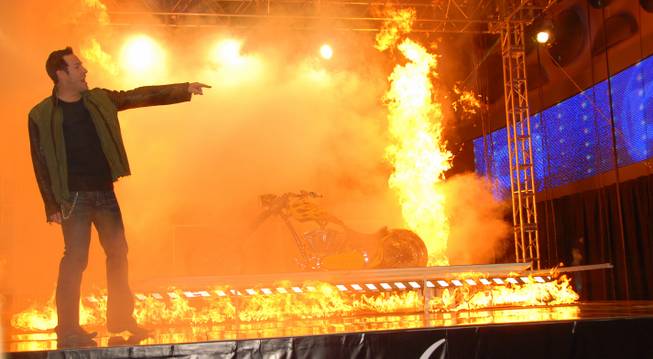
Steve Wyrick Real Magic
Steve Wyrick reveals the custom SW-1000 that the OCC crew of TLC’s “American Chopper” built for him.
Tuesday, June 22, 2010 | 12:05 a.m.
Steve Wyrick and I have a lot in common. Both of our dads wanted us to practice law, but both of us wanted to practice magic. We both watched David Copperfield on TV, and we both wanted to become the next David Copperfield.
The difference between us is this: Early on, I realized I wasn't Copperfield-caliber material; Wyrick never did.
His failure to realize that cost him dearly. Specifically, it cost him $54 million — that's how much debt he's got, according to a May 17 bankruptcy filing.
Fifty-four million dollars in debt, $93,000 in assets.
How is that even possible?
Well, Wyrick once claimed to be a better businessman than magician — that should tell you something about his show.
Yes, some tourists paid to see Wyrick's act, but, according to several sources, that's primarily because ticket resellers pushed it hard — because Wyrick reportedly offered the resellers a big percent of the proceeds to do so. Tourists would hear the resellers' pitch, glance at Wyrick's publicity shots — Wyrick hanging from his helicopter, Wyrick leaning on his Learjet 35, Wyrick sitting on his motorcycle — and think, Why not?
Well, here's why not: Wyrick's mediocre at magic. He only was able to achieve (moderate) success and woo investors because 1) he looked like David Copperfield in his publicity shots; 2) the economy was booming; and 3) it's Vegas, baby!
That's what makes Wyrick's tale so unique: It couldn't have happened at any other time, in any other place.
Wyrick accumulated debt after debt and spent dollar after dollar. He surrounded himself with rare magic lithographs (of Alexander, of Carter, of Houdini, of Thurston) and historic neon signs (the "A" from The Algiers, for starters). And he threw extravagant house parties to show them off.
My roommate, a former Folies Bergere showgirl, went to one of these parties:
"The house was amazing," she said. "He had all this expensive art and magic stuff on the walls. And he had a big tent set up in front. There were, like, 10 red-velvet couches with plush cushions, and a red carpet, and ... two long tables of food. It looked like there was enough to feed 300 or 400 people."
"And how many people showed up?" I asked.
"Less than 100."
Another friend of mine dated Wyrick for a couple of months:
"He had the Porsche," she told me, "and he had that huge house, and he had expensive furniture and really expensive magic art — he told me each one was worth $200,000. He took me to Hawaii and stuff like that, but he wasn't always spending. He wasn't one of those guys. He actually liked going to Denny's."
That's a good thing for Wyrick, because these days, Denny's might be the only restaurant he can afford. According to the court filing and other sources, when Wyrick filed for bankruptcy, he had $20 in his pocket, $45.99 in a U.S. Bank account, $5 in a Wells Fargo business checking account and $5.33 in a Wells Fargo savings account. He's living off checks from his mom, and residing at the home of his former costume/wardrobe lady.
This is the story of the former headliner's fall from fame.
Warning signs
Gale Steven Wyrick grew up in Garland, Texas. As a teenager, he put together a nine-minute manipulation act and performed it at magic dealer Howard Hale's 1985 Magicland convention. The performance had a glitch. Two, actually: 1) Wyrick left his billiard balls — the props he needed for his finale — at home; and 2) he literally fell flat on his ass during the show. Wyrick described the performance to Magic magazine like this: "It truly was a train wreck!"
In the years that followed, Wyrick performed his act for his senior-class talent show, and spent a lot of time studying Copperfield.
"Every time David has a special on TV," Wyrick told Magic, "I was there by my VCR. Every time he would come to town, I would have my mom drive me to the back of the theater and I would sit from 8 a.m. right up to show time, watching every case come off that truck. The guy was a god to me, and he still is."
With an act and an idol, Wyrick borrowed $5,000 from his mom, and in the early '90s used the money to rent out the 250-seat Owens Theatre in Branson. Wyrick's mom moved to Branson and worked as her son's ticket collector.
What did Wyrick learn from the year he spent in Branson? According to the Magic interview, he learned that "the more you ask for, the more respect you get."
Wyrick moved from Branson to Vegas and opened a show at Lady Luck called Sexy Magic. Ticket sales were poor; Wyrick blamed the title.
But Bill Bennett, owner of The Sahara, believed in Wyrick. Bennett built Wyrick a $56 million theater, and in 1999 signed Wyrick to an eight-and-a-half-year contract.
The show closed after two.
Before it did, though, John Moehring reviewed it for Magic. It's one of the most scathing reviews the magazine has run.
"Quite frankly," Moehring wrote, "it was the perfect time to demand a refund. And it just wasn't due to the fact that good money had been paid to see a really bad show. It was because Steve Wyrick, 'Magician of the Year' at the Sahara Hotel & Casino, had not delivered the show that he had touted."
Moehring writes about how Wyrick botched an illusion and joked about the botch with his audience:
"Apparently," reported Moehring, "something went astray in the performance of the next trick. A white dog is put into a white cabinet and a black dog is loaded into a black cabinet. The two containers are mounted on a trestle-like table, and the canine 'boxcars' are awkwardly tracked onto one another. After some fumbling and prying at the merged cabinets, panels fall open to reveal the dogs are gone or elsewhere (barking continued to emanate from the loudspeakers). Dismissing the canine train wreck, Steve mutters, 'We'll get back to that one later.'"
(The dogs were supposed to turn into a Dalmatian.)
According to Moehring, the mistakes didn't end there. Wyrick also flubbed the "Sam the Bellhop" card trick a couple of times.
Moehring spoke with Wyrick after the show, and Wyrick told him, "You caught me with my pants down."
Unlike Moehring, Aladdin CEO Bill Timmins liked what he saw in Wyrick. In 2003, Timmins offered Wyrick a gig at The Aladdin, and then built the magician a $35 million theater, magic shop and "UltraLounge."
In January 2004, Mike Weatherford reviewed Wyrick's Aladdin show for the Review-Journal:
"It's that talking stuff that's troublesome," Weatherford wrote. "Wyrick never seems sure if he's David Blaine, David Copperfield or David Carradine." In a later review, Weatherford wrote, "Wyrick is more like an actor running through the cues. He could stay home and hire any magician to play himself."
Magic sent Shawn McMaster to review Wyrick's show in 2005. Wyrick's "Sam the Bellhop" trick hadn't improved:
"[H]e had numerous problems doing a one-handed cut," wrote McMaster, "which led him to comment apologetically to the audience about the deck being 'brand new.' He also attempts Zarrow Shuffles during the course of the effect, and 'attempts' is the only word that can be used here, as he never really executes one convincingly. Furthermore, a deficient false shuffle should not be projected onto an eight-foot-high video screen."
I never got to see Wyrick's show myself. But I have seen the YouTube videos. They're posted on a YouTube channel named "InDebtProductions."
Judging by Wyrick's publicity photos alone, I could have told you the guy was a Copperfield knockoff. But I never could have imagined the depth and the breadth of his copying until I watched the YouTube videos with my own two eyes.
Saying Wyrick was "influenced" by Copperfield would be like saying the Gustav Klimt poster hanging on my dining room wall was "influenced" by Gustav Klimt. Wyrick copied Copperfield's tricks, Copperfield's lines, Copperfield's speech pattern, Copperfield's movements, Copperfield's music and Copperfield's emotionalism.
Wyrick and Copperfield were friends for a while — that's common knowledge among magicians. So there's a chance that in the course of that friendship, Copperfield helped Wyrick with his act. And if Wyrick and Copperfield had entered into some sort of mentor/mentee relationship, it might be unfair to say that Wyrick's Planet Hollywood show was a "copy" of Copperfield's old act. If Copperfield really did help Wyrick, you could argue that Wyrick wasn't unoriginal, but molded. (Copperfield couldn't be reached for comment by press time.)
Adding injury to insult
Last year, Wyrick planned a Fourth of July publicity stunt of Houdini-proportions. He called it "Death Drop."
He was going to have his assistants lock him into a box. The box was going to be raised 120 feet in the air, by crane, and then moved above 500 flaming spikes. The four ropes running from the crane to the box were going to be set on fire. And Wyrick was going to escape before the ropes burned through and the box dropped onto the spikes.
At least, that was the advertised plan.
A crowd gathered outside Planet Hollywood.
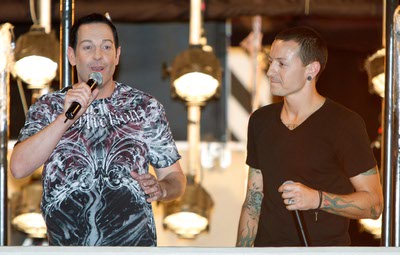
Daredevil magician Steve Wyrick joined by Chester Bennington, Linkin Park frontman and co-owner of Club Tattoo, celebrate the opening of Club Tattoo with a stunt called the "Death Drop." On Saturday at the Miracle Mile Shops at Planet Hollywood, magician Steve Wyrick attempted a stunt called the "Death Drop." After Wyrick was locked in a box, the ropes attached to the box that attached it to a crane were lit on fire. The fire flared up but was extinguished before the box was raised up in the air. Wyrick reappeared in a helicopter that landed on Las Vegas Boulevard between Planet Hollywood and CityCenter.
"This has never been done before," Wyrick told them (the entire episode is available on YouTube), "so anything can happen. I'm running on a few hours' sleep."
Wyrick stepped into the box and gave the microphone to his assistant.
"It looks like we're going to chain his hands," the assistant said. "All right. These are for real — the real deal. These are, like, super-heavy duty, uh, Master Locks here. So if anyone is wondering the legitimacy of this, it is absolutely real. Are you guys ready to see him go up?"
The crowd cheered; they were ready.
"This is, uh — these things are real," the assistant continued, "these things are wrapped with some crazy fire stuff — I don't even know."
The assistant was referring to the black curtains going up around the box. He seemed to be saying they were fire-retardant, that they were meant to protect the audience from the fire.
Oh, the irony; a couple seconds after another one of Wyrick's assistants lit the ropes on fire, the curtains went up like tissue paper.
Men in black shirts and black pants rushed the box, fire extinguishers in hand. To extinguish the apparatus's flames, they had to spray for more than a minute.
The booing began.
Then, a short while later, Wyrick appeared on a helicopter — ta-da? — but by then the audience had lost its buzz.
When the curtains caught fire, the audience didn't seem shocked. They must have assumed the fire was part of the illusion. But once Wyrick's assistants opened the box and Wyrick's stage double, Jeffrey Jay, got out of it, the audience realized the trick had been flubbed.
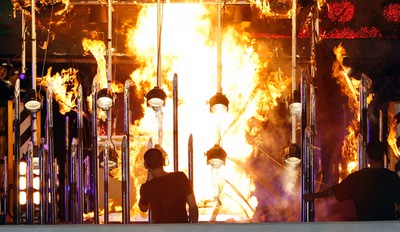
On Saturday at the Miracle Mile Shops at Planet Hollywood, magician Steve Wyrick attempted a stunt called the "Death Drop." After Wyrick was locked in a box, the ropes attached to the box that attached it to a crane were lit on fire. The fire flared up but was extinguished before the box was raised up in the air. Wyrick reappeared in a helicopter that landed on Las Vegas Boulevard between Planet Hollywood and CityCenter. Here, Linkin Park frontman and Club Tattoo co-owner Chester Bennington watches with the stunt.
From a magic point of view, the flub was a disaster. Wyrick's assistant had implied that the curtains were fire-retardant — that was their justification, their ostensible reason for surrounding the box. But once they went up like the Hindenburg, it became clear to the audience that they'd probably been raised to facilitate the switch between Wyrick and his double.
Jay, the double, filed a lawsuit against Wyrick on August 13, 2009, in the District Court of Clark County, in which he claimed he was rendered sick and lame and received both internal and external injuries, resulting in great pain, suffering and anxiety.
Nonetheless, in an interview posted on an LA Times blog, Wyrick said, "I am definitely going to reattempt Death Drop."
Making awards appear
To the best of my knowledge, nobody ever questioned Wyrick's résumé until now.
According to one of Wyrick's old press releases, Wyrick "walked away with the top awards at both the International Brotherhood of Magicians and the Society of American Magicians annual competitions." The press release also said, "Once every four years the Olympian like Federal Congresso DeMagica' DeSpain is held for top magician from all around the world. Still 15, Steve took ninth place at this largest and most prestigious of all competitions!"
Let's start with the International Brotherhood of Magicians: Wyrick did win first place in their competition, but, according to a 1985 Linking Ring article, he won first place in the Junior Stage Magic category, not the main one. People who aren't serious magicians would assume the young Wyrick beat out men and women twice and three times his age.
Next, the Society of American Magicians: When participating in the SAM's competition, Wyrick did enter the adult category, but he didn't win. He took home the second-place "Award of Merit," not the first-place Chairperson's High Score award. So Wyrick got "top honors" in the SAM competition in the same sense that John McCain got "top honors" in the 2008 election.
And what about the Federal Congresso DeMagica' DeSpain — "the largest and most prestigious of all competitions"?
I've never heard of it.
I contacted two magic historians and one acclaimed Spanish magician to ask whether any of them had heard of it.
They said that they hadn't.
Remember, we're talking about what is ostensibly the largest and most prestigious of all competitions — and Wyrick mentioned it in not one, but two press releases.
If the "Federal Congresso deMagica DeSpain" is (or at one point was) the "largest and most prestigious" magic competition, I'd be able to find at least one mention of it on Google, right?
Well, I couldn't find even one.
In reality, the Fédération Internationale des Sociétés Magiques (held every three years) is the largest and most prestigious magic competition, and the only award Wyrick truly deserves is one for résumé padding.
See you in court
And it makes you wonder, if Wyrick could get away with exaggerating his success and with flubbing magic tricks for so many years, what couldn't he get away with? Well, there was one thing ... The lawsuits. He couldn't get away from the lawsuits. They piled on, one after another.
According to bankruptcy documents, Wyrick didn't pay many of the people who did magic-related work for him.
I spoke with one of Wyrick's debtees — I promised I wouldn't reveal his identity — who had this to say:
"Steve's always been nice to me. Always comped me and my family when we came into town, and he's always been personable. I have nothing against him as a person."
"But as a businessman..."
"My company had a relationship with Steve for a number of years. From the time when he was four-walling that show downtown through his move to the Strip. About eight to 10 years, I'd say. Over the course of those years, he'd sometimes pay us up front, and sometimes we billed on open account. He established a relationship with us, and we thought he was credit-worthy — mistakenly, it turned out. And now he owes us a lot — well, not a lot compared to how much he owes some other people, but it's a lot for us."
"So it was a total surprise when he didn't pay you at the end?" I asked.
"I guess it wasn't a total surprise. There were red flags: The fact that the show kept closing and moving. The fact that if you went to his shows or his magic shop, you could see there wasn't a big amount of traffic there. The fact that he was a self-promoter. In my book, any time somebody is telling you how successful they are, how things are going to get better for them, it's a red flag."
The red flags piled up, particularly in the late 2000s. Wyrick stopped paying his rent, and on January 15, 2010, the Miracle Mile Shops took back Wyrick's theatre, valued at $16 million. Miracle Mile then got an injunction barring Wyrick from opening the doors to his theater and removing his props.
Wyrick's stage props are very valuable ... but they're not worth $54 million. (For starters, Wyrick's LearJet was gutted). So where'd all the money go? To a secret Swiss bank account? To a safety deposit box in Antwerp? No and no.
As best I can tell, it all went into Wyrick's show.
Most financially troubled productions close shortly after they open. But Wyrick's didn't. Wyrick was able to keep his show afloat because he kept finding more and more investors, and more and more people willing to work for him without upfront payment — the bankruptcy filing makes this clear.
First there are the big players — the investors who loaned Wyrick cash. Wyrick owes $15 million to developer Stephen Tebo, $7.5 million to Texas businessman Byron Burke Barr and $5 million to investor/Star Mobile Homes owner Hollis Campbell. Wyrick also owes $6.62 million to the Miracle Mile Shops. None of the above parties returned phone calls for comment.
Then there are the expected expenses: $900 to a scenery company, $686 to a lighting company, $4,000 to another lighting company, $25,000 to a third lighting company, $375 to a storage company, $77.55 to a beverage distribution company and $1,000 to the City of Las Vegas for parking fines.
And then there are the small and odd expenses: $1,683.15 to Fun City Popcorn, $260 to La Salsa Cantina, $640 to Red Bull North America, $611.51 to Sparkletts and $1,700 to the country Fire Department.
When you add up all the figures — the hundreds of thousands owed to various managements companies and law firms, the hundreds of thousands owed to the state of Nevada, the hundred thousand owed to the IRS — it doesn't take long to get to $54 million.
So why did Wyrick keep asking for more and more money? Why'd he keep soliciting work from companies he couldn't pay? Why'd he keep digging himself deeper and deeper into debt? Did he really think he could turn things around financially? Did he really think he could make it back into the black?
Maybe, but that's not the point. For Wyrick, money was never the point. Judging by his own words, the point was becoming the next Copperfield.
Wyrick wanted it so badly that he wouldn't let anything get in the way, including his bad magic act and mounting debt.
*****
Early on in the process of collecting information for this story, I tried contacting Steve Wyrick by Facebook. It was just a formality; I didn't expect him to write back. So you can imagine how shocked I was when I picked up the following message on my voicemail:
"Hey, Rick. This is Steve Wyrick. I wanted to give you a buzz, touch base, and say hello. I received, through an assistant of mine, e-mails that you had sent, as well as the e-mail on Facebook. I've been out of town. Any inquiries should run through my attorney, who is Zach, and I believe you had left a message for him. Anything else — you'd mentioned that we'd not met, and that is very true. I'd love to meet you. One thing I love to do is talk magic. I love to say hi to all magicians. So if you're going to be around, it's going to be about two weeks, and I'll be back in town. I'd love to meet with you and say hi, and just kind of chat magic, man. Let me give you my cell number as well ..."
And then Wyrick gave me his cell number. So I called it.
Before our talk, I didn't understand why anybody in his right mind would give this guy a penny.
But now I do.
The guy is a master of the schmooze. On the phone, he did absolutely everything right. He was incredibly polite, incredibly friendly and he said absolutely nothing of consequence. You'd never know you were talking to someone who's in such a financial sinkhole.
Wyrick repeated that if I had any specific questions, I should direct them to his attorney. And then told me, "We should get coffee after your story runs."
"After my story runs," I told him, "you're not going to want to have coffee with me. I don't want to be coy; this story is very critical. A lot of people have very negative things to say about you. And that's why I was hoping you could answer some questions, to maybe set the record straight ..."
"The story's going to turn out great," Wyrick assured me. "You're in touch with some great people who will be able to give you a lot of great answers. And I see that you're a digger. So here's what I'll say: Turn over all those rocks, man, because I think you'll find a lot of interesting stuff."
I submitted numerous questions to Wyrick's attorney (e.g., Why can't I find any evidence of the Federal Congresso DeMagica' DeSpain?), but I didn't hear back. So I sent an e-mail to Wyrick's attorney asking for confirmation that the questions had been received. Didn't hear back. So I called his attorney's office to ask for confirmation. No response. So I sent the questions to Wyrick via Facebook and told him that he could have some extra time to answer them. Didn't hear back.
I'm guessing coffee's off....
— Originally published in Las Vegas Weekly
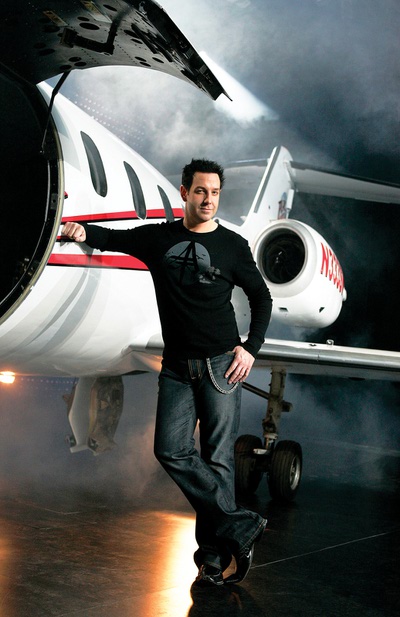
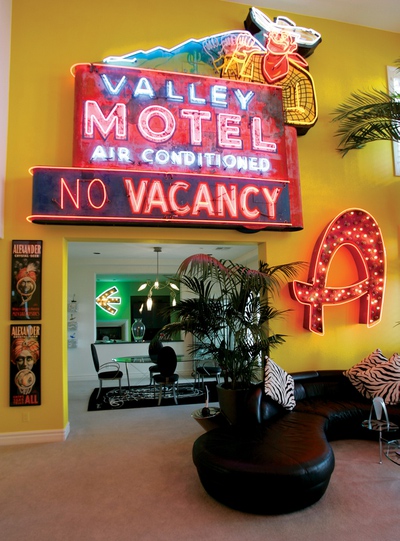
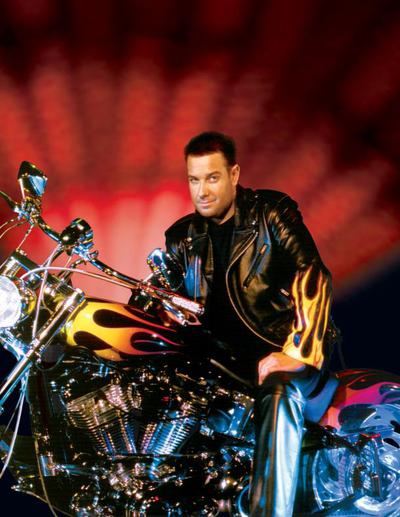

Join the Discussion:
Check this out for a full explanation of our conversion to the LiveFyre commenting system and instructions on how to sign up for an account.
Full comments policy